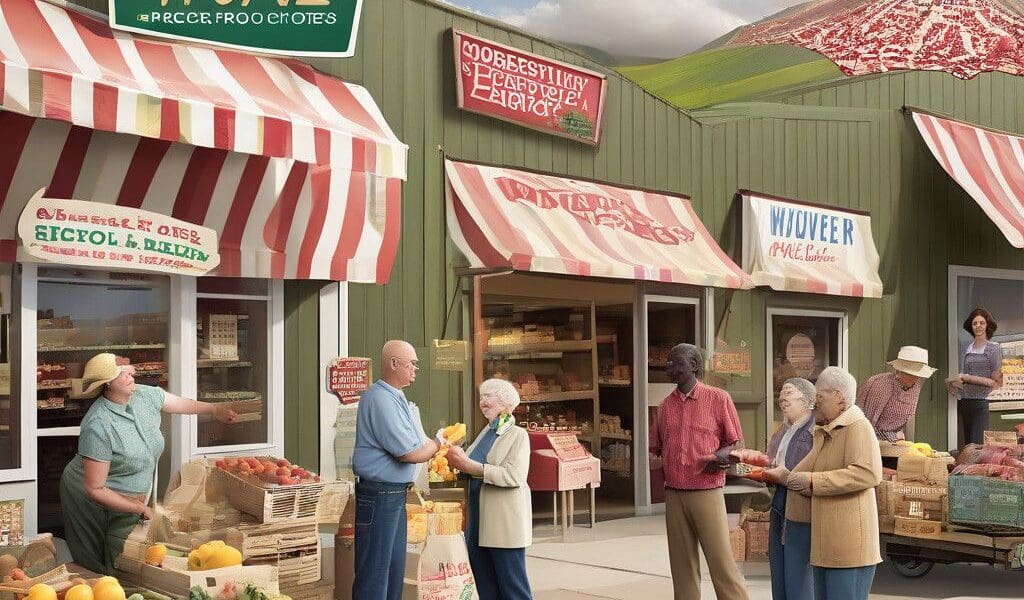Ensuring access to fresh and nutritious food in rural and underserved areas is increasingly becoming a priority for many states, particularly in the Midwest. Illinois leaders have recently announced a significant initiative, providing $7.8 million in grants aimed at enhancing food accessibility by supporting grocery stores in regions classified as food deserts by the U.S. Department of Agriculture. This commitment reflects a broader trend as states work diligently to bolster local economies while addressing pressing food equity issues.
Governor JB Pritzker and representatives from the Illinois Department of Commerce and Economic Opportunity (DCEO) detailed how the funding will assist selected grocers in constructing new stores and upgrading existing ones. Notably, four grocery operators received funding under the Illinois Grocery Initiative’s New Stores in Food Deserts program. Recipients include Harvest Supermarket in Peoria, Rancho Supermarket in Rockford, Our Market At The Plaza Cooperative in Carlinville, and Forty Acres Fresh Market, LLC in Chicago. These investments are expected to create jobs and stimulate local economies while significantly improving food access for residents.
Kristin Richards, DCEO Director, emphasizes the transformative impact of the initiative on community livelihoods. “Through the Illinois Grocery Initiative, the State of Illinois is changing lives and livelihoods by making it easier to put fresh food on the table,” she stated. The second round of funding, amounting to $11 million, is already in the pipeline, encouraging more businesses to consider establishing their operations in underserved areas.
Besides these initiatives, the state is also providing grants to seven local grocery stores allowing them to procure energy-efficient equipment. Noteworthy inclusions in this support list feature Smalls Meat Markets in Marion, Riverside Foods in Riverside, Bob’s Red Fox, Inc. in Pleasant Hill, and more. This approach is not only geared towards enhancing food access but also focuses on sustainability in grocery operations.
Supporting grocery businesses is crucial, as demonstrated across the Midwest. Iowa’s Center for Rural Affairs, for instance, is offering grants of up to $25,000 for rural grocery stores and small food processors. The Rural Innovation Grant Program aims to boost the capability of these grocery stores to provide much-needed food resources in their communities. Cynthia Farmer, a senior policy associate with the Center for Rural Affairs, stressed the significance of grocery stores in rural communities: “Grocery stores and food processors play a critical role in rural communities by providing access to healthy, nutritious food.”
Nebraska also recognizes the need to support local grocers. The Nebraska Grocery Industry Association and the Nebraska Cooperative Development Center recently organized a grocery summit to identify challenges and share knowledge on effectively serving customers in rural settings. Discussions included potential legislative support aimed at providing low-interest loans or grants to rural grocery businesses. State Senator Teresa Ibach voiced the importance of such initiatives, noting that providing financial assistance can significantly reduce the burden on small grocery operators.
The importance of addressing food deserts cannot be overstated. Areas lacking access to fresh groceries often display higher rates of diet-related health issues, as residents resort to convenience stores or fast-food options that do not provide adequate nutrition. By supporting local grocers, states aim to reverse these trends and promote healthier lifestyles.
Moreover, grocery stores are vital economic engines. They create jobs, stimulate local spending, and often form community hubs that gather residents together. Investing in grocery stores not only serves an immediate need but lays the groundwork for long-term community resilience and well-being.
As state governments enhance their focus on food equity, similar initiatives are likely to grow across the nation. These investments reflect a recognition of the interconnected nature of food, health, and community prosperity.
The potential for subsequent programs and grants shows promise for addressing food deserts and fostering economically viable grocery stores. As these programs expand, they could make a substantial difference in reducing food insecurity and increasing community health across rural and underserved regions.
To sum up, the efforts made by Illinois, Iowa, and Nebraska represent a vital and strategic response to food inaccessibility. The benchmarks set by these actions could serve as models for other regions seeking to create supportive frameworks for local grocery operators, ultimately enhancing food security and community health across the nation.












